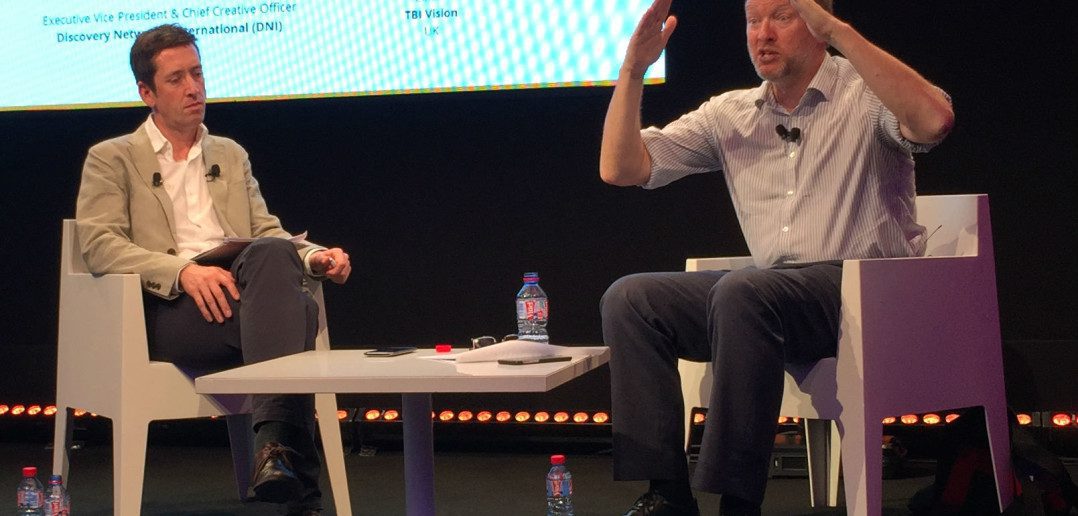All weekend, the attendees at the MIPDoc conference have been hearing about the trends, opportunities and challenges in the market for documentaries and factual entertainment. To finish off, Discovery Networks International’s EVP and chief creative officer Phil Craig sat down for a keynote interview on how his network is tackling all these issues. He was interviewed by Stewart Clarke, editor of TBI Vision.
“One-word brief: scale,” he said, when asked about what he was brought in to Discovery Networks International to do. “There’s a great desire for us to expand and to grow.” He’s a poacher-turned-gamekeeper, having moved from being an independent producer to his commissioning role. How did he find Discovery in those former days?
“I did feel that there was a filtering problem. There was a lot of it. The messages coming out of Discovery to producers were more about what they didn’t want, sometimes, than what they did,” he said. “The filter was very tight, and put quite simply, I’m trying to loosen it up a little bit: to open it up to ideas maybe you wouldn’t have brought to us four or five years ago… Bring us things that might surprise us, bring us things that we might have commissioned 10 or 15 years ago, not four or five years ago. Bring us hunches.”
Craig showed a clip of Ocean of Fear, which told the story of a second world war incident where capsized sailors faced up to an ocean . “That show did pull people in with a rather sensational premise: ‘This is the greatest shark attack in history’… but what was truly interesting about it was the sharks hardly killed anybody. Sharks are scavengers, they would rather hang about and wait for something to die… It actually became a story about scavenging, not attacking.”
Craig also talked about getting back to one of Discovery’s original core genres: wildlife, which the network had moved away from somewhat in recent years. “To me, Discovery without animals isn’t really Discovery,” he said, harking back to the 80s and 90s when “it was a place you could find the most wonderful portrayals o the world, of nature, of animals. That sense of wonder… It was very high on my agenda.”
One show that has already been commissioned is Life of Dogs, which he said combines a world-class filmmaker, a populist subject and – just as importantly – a good story. “That’s been the problem with natural history: the story has been lacking,” he said, while promising to show that the genre is more than just a televisual screensaver. “The story of our relationship with dogs is actually fascinating… It’s a good example of somebody taking a classic genre that you might have found on Discovery 10 to 15 years ago, and making it in a way that suits 2015/2016.”
Craig described it as a stake in the ground to show that “DNI can rival BBC Bristol” for natural history programming. “Absolutely, I think we can. Throwing down the gauntlet!”
Discovery bought All3Media last year, with its stable of production companies. Is that a worry for other independent producers: do they need to get to the back of the queue because there are so many in-house people pitching now? “We have a big pipeline to fill. We’re commissioning at least 110 hours this year, probably at least 20 series,” said Craig. “We’re interested in working with companies inside the family and outside the family… It is a great time to pitch us.”
What is the rights position with Discovery: it fully funds but is it more flexible on giving up rights?” It’s not changing much… what you lose in terms of back-end you hopefully gain in terms of a long-term relationship and a big commission,” he said, before stressing that “we are flexible: for something we really want, we will lean on the business affairs people.”
How will Craig work with the US mothership? “DNI has got a pretty good history of making programmes that work in the States as well as in other territories,” he said. “There’s a real meeting of minds between the sort of things Ive been saying and the sort of things [president]Rich Ross has been saying… I know he’s very excited, as are we, about this acquisition we made at the Sundance Festival called Racing Extinction… It’s a campaigning piece… It’s a call to arms, it’s actually quite uplifting in its tone. It’s a can-do film about how people can get together and make change happen.”
The film will air on the same day in the US and internationally, rolling around the world from New Zealand rather than having to wait for the US to screen it first – a strategy that Craig praised Ross for being completely behind, even though Discovery US paid for the acquisition.
Clarke asked about HBO executives coming over to Discovery, and whether that fits with the factual remit of DNI. “We’re excited about it because it sends a big message,” he said, talking up the shows that will emerge over the next couple of years from Discovery US. “Obviously more entertainment driven, but still with some great journalism at the heart of them.”
Ross had talked about “faux factual” in a recent speech. Are character-led reality shows failing to deliver the authenticity that viewers want? “Reality television had become too unreal,” said Craig, talking about a show called Free Ride: a new take on travel adventure formats where somebody travels without a plan or any money, relying on the goodwill of strangers. “It’ll have that low-fi slightly never-quite-sure what’s going to happen feel, and never over-constructed. I think a lot of television has become over-constructed.”
When will DNI start making drama programming? “I’m kinda developing one special, but nothing on the scale of what Rich is doing [at Discovery US],” he said. “There are some amazing stories that lend themselves naturally to drama, and feel very Discovery… I’m looking at military, and I’m looking at big science in terms of places that you can set scripted situations. But I am proceeding fairly slowly and cautiously. It’s a year, 18 months.”
Craig was asked about non-Discovery brands on Discovery, like TLC. “As I look to grow the department, I wanna do more. And I particularly wanna do more in female-focused factual rather than lifestyle,” he said. “Resources permitting, I’d like to do more… It’s only been a year or 18 months since Discovery absorbed, or tried to absorb the SBS group. They do amazing work up there. It’s a priority for us to understand some of those shows that work… There’s still a lot to absorb from that meal, to digest from that meal.”
He added that he’s a great fan of sports documentaries, and is looking to co-fund two documentaries, leveraging access to sports rights and pairing that with storytelling. The final question was about whether the new job has gone as he expected. “It’s kinda annoyingly exactly what I’d expected… it’s a wonderful opportunity to be part of a company that’s about to really grow, and to be in the part of it that’s already growing,” he said.
“I’m still not completely across everything that we’re making in Latin America and the Nordics: there are people making shows for me in languages that I don’t speak! A flair for delegating is coming into it… That’s the challenging part of the job, but it’s also really exciting.” And he finished by talking about Discovery as a family brand: “Some degree of the output drifted away from that, and we want to put it back,” he said. “Our shows should speak to parents, who’ll say ‘we want Discovery in our life’.”
Check out MIPTV, MIP Digital Fronts, MIPDoc & MIPFormats 2015 full live coverage




